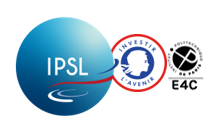The Institut Pierre Simon Laplace (IPSL)
IPSL gathers 9 laboratories (CEREA , GEOPS ,LATMOS , a unit of LERMA , LISA , LMD , LOCEAN , LSCE and METIS) whose research topics concern the global environment. These laboratories are developing a common strategy for the study of the Earth System as a whole and for the study of other objects in the solar system. Its main objectives are:
- to understand the dynamical, chemical and biological processes at work in the oceans and in the atmosphere, and the processes of exchange of matter and energy between the atmosphere, oceans and biosphere, and in particular to understand the water and carbon cycles;
- to understand the natural climate variability at regional and global scales, together with the past and future evolution of our planet;
- to understand the impacts of human activities on the ozone layer and on the climate, and to predict climate at seasonal and inter-annual scales (monsoon, El Niño, North Atlantic Oscillation) and the horizon of the end century;
- to use our skills on the terrestrial environments to explore other planets.
The IPSL laboratories set up, at federal level, common services and major scientific projects to serve its scientific strategy.
- A unit dedicated to climate modelling studies the natural variability of Earth climate and the anthropogenic influence on it. It develops a numerical model that couples atmosphere, ocean, continental surfaces and atmospheric chemistry models developed in the IPSL laboratories.
- A Data Center provides IPSL teams with data. At national level, it is responsible for the ETHER data center on atmospheric chemistry and participates in the center of expertise ICARE specialized in the study of aerosols and clouds.
- IPSL is responsible for several observation services (monitoring of stratospheric ozone, of greenhouse gases and of carbon flux in the ocean and atmosphere) and modelling services (ocean and air pollution) as well as of an instrumental site labeled by INSU / CNRS.
- The "Solar System" unit aims at understanding the formation, dynamics and long-term evolution of the neutral and ionized atmosphere of the Earth and of the planets, and their interaction with the solar wind.
- The "Group for regional climate and environment studies" is interested in the water cycle and in the medium-scale processes involved in this cycle.
- The Center for Innovation and Space Instrumentation develops innovative instrumentation (remote sensing for space observations, airborne and ground-based measurements) and instrumental simulators.
|


